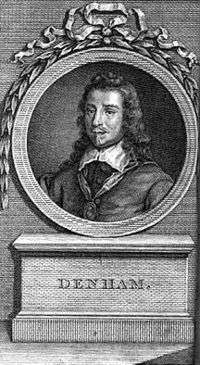John Denham (poet)

Sir John Denham FRS (1614 or 1615 – 19 March 1669) was an Anglo-Irish poet and courtier. He served as Surveyor of the King's Works and is buried in Westminster Abbey.
Early life
Denham was born in Dublin to Sir John Denham, Chief Baron of the Irish Exchequer, and his second wife Eleanor Moore, daughter of Garret Moore, 1st Viscount Moore. He was educated at Trinity College, Oxford and at Lincoln's Inn in London.
In his earlier years Denham suffered for his Royalism; during the English Civil War, he was appointed High Sheriff of Surrey (for 1642) and governor of Farnham Castle.
After 1660
Denham became a Member of Parliament for Old Sarum in 1661, became a Fellow of the Royal Society on 20 May 1663, and became a Knight of the Bath. He built or commissioned the original Burlington House in Piccadilly in about 1665.
After the Restoration Denham became Surveyor of the King's Works, probably for reasons of his earlier political services rather than for any aptitude as an architect. John Webb, who, as Inigo Jones's deputy had the competence to have served in the post, and complained "though Mr. Denham may, as most gentry, have some knowledge of the theory of architecture, he can have none of the practice and must employ another."[1] There is no evidence that he personally designed any buildings, although he seems to have been a competent administrator; he may however have played some part in the design of his own home, Burlington House. John Webb was appointed Denham's deputy by 1664 and did Denham's work at Greenwich (from 1666) and elsewhere.
Denham made an unhappy marriage, and his last years were clouded by dementia. With Denham's increasing mental incapacity, Charles II requested in March 1669 that Christopher Wren be appointed Denham's "sole deputy"; Wren succeeded him as King's Surveyor upon his death two weeks later. Denham was buried in Poets' Corner of Westminster Abbey.
Works
Denham began his literary career with a tragedy, The Sophy (1641), but his poem, Cooper's Hill (1642), is the work by which he is remembered. It is the first example in English of a poem devoted to local description, of the Thames Valley scenery round his home at Egham in Surrey. Denham wrote many versions of this poem, reflecting the political and cultural upheavals of the Civil War.Denham exerted an influence on versification and poetical utterance (which along with his contemporary Edmund Waller), earned them the title of 'Sons of British Poetry'[2] He also received extravagant praise from Samuel Johnson; but the place now assigned him is a more humble one.
References
- ↑ Quoted in Howard Colvin, A Biographical Dictionary of British Architects, 1600-1840, 3rd ed. (Yale University Press), 1995, s.v. "Denham, Sir John;" Denham has a brief entry ex officio.
- ↑ Giffillan, George (ed) introduction -Poetical Works of Edmund Waller & Sir John Denham 1857 kindle ebook ASIN B0084BSUYA
-
 This article incorporates text from a publication now in the public domain: Cousin, John William (1910). A Short Biographical Dictionary of English Literature. London: J. M. Dent & Sons. Wikisource
This article incorporates text from a publication now in the public domain: Cousin, John William (1910). A Short Biographical Dictionary of English Literature. London: J. M. Dent & Sons. Wikisource - H.M. Colvin, A Biographical Dictionary of British Architects, 1600-1840 (1997) ISBN 0-300-07207-4
- Kelliher, W. H. (January 2008). "Denham, Sir John (1614/15–1669)". Oxford Dictionary of National Biography. Oxford University Press. doi:10.1093/ref:odnb/7481. Retrieved 2009-06-07.
External links
| Wikiquote has quotations related to: John Denham |
| Court offices | ||
|---|---|---|
| Preceded by John Embree |
Surveyor of the King's Works 1660–1669 |
Succeeded by Christopher Wren |
| Parliament of England | ||
| Preceded by Seymour Bowman John Norden |
Member of Parliament for Old Sarum 1661–1669 With: Edward Nicholas |
Succeeded by Edward Nicholas Eliab Harvey |